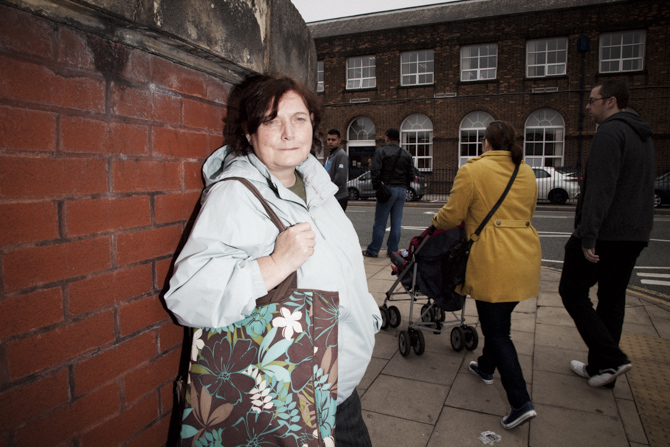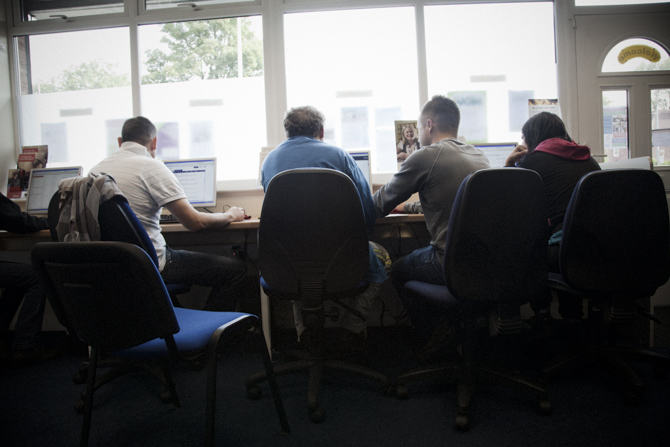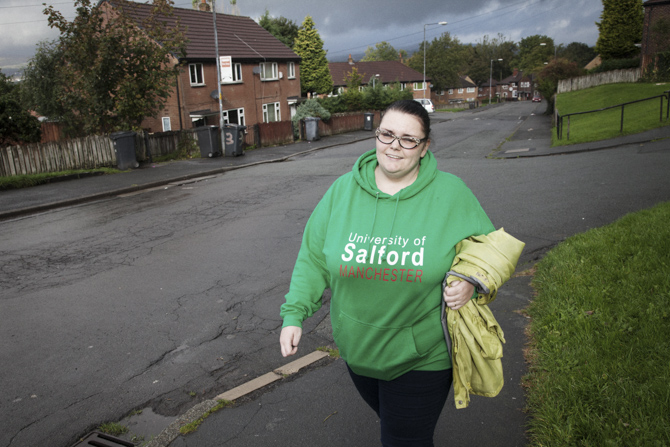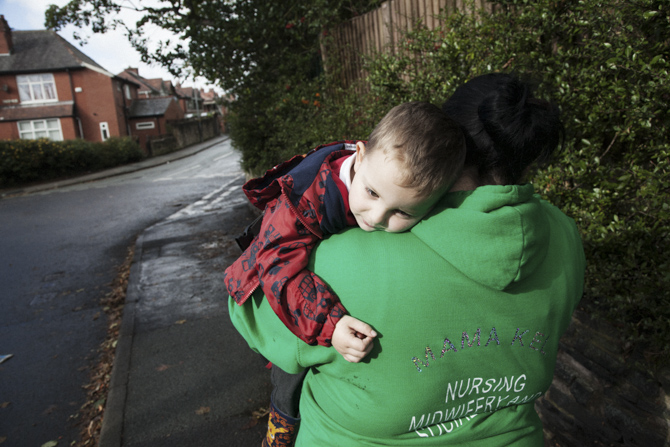It’s two weeks later and I am walking with Morag through the town centre to one of Bolton’s two Jobcentres. A report on the radio this morning suggested there are nearly as many new store openings on UK high streets as there are closures. Bookmakers, charity shops and pawnbrokers top the list of new openings.
“When did you last have a job?” I ask as we negotiate a busy crossing.
“Because of my health I haven’t worked for 27 years,” says Morag, “except for a few weeks as a classroom assistant. I’ve been on Incapacity Benefit. But now I’ve been put on Jobseeker’s Allowance. I came yesterday to sign on and this morning I’m seeing my advisor. I have to show I’ve been looking for work.”
“What happens if you can’t show you’ve been looking?”
“They can sanction you. They can take some of your money from you.”
We reach a nondescript two-storey building opposite a bingo and casino complex. It must only recently have become a Jobcentre because the only signs yet up are those declaring the building is protected by G4S.
“Cath said I have to go in with a positive attitude. I’m supposed to smile… to say it’s been nice weather. The woman will look at me as if I’m mad.”
Morag says she’ll be ten minutes but it’s nearer half and hour before she is out on the pavement again.

“So what did you say to her?”
“I said, Good Morning!” she says in a high-pitched, cheery voice. “But she just said, Yeah.”
“And what did you talk about?”
“She went through my CV but wasn’t very happy. She said there was no point saying I wanted to be a classroom assistant on a CV that I was sending in for a retail job. I have to do more specific ones for particular types of jobs.”
“That makes sense. Do you know how to do that?”
“There’s someone at the UCAN job club who will help me. He’s really good with CVs.
“And then there’s a thing called Universal…” Morag thinks for a second, “… Universal Jobmatch. You have to register online and they give you a number. And you have to keep logging in with that number and going through all the jobs. That way they can see if you are actually looking for work.
“She said for next week I definitely have to be on it, otherwise she could dock money off me. She might say I haven’t earned my money one week and that will be it. You have to toe the line.”
“And how much do you get each week on Jobseeker’s Allowance?”
“£71.70.”
“£71.70? And how much do you have to live off after bills and that?”
“£15 a week before I’ve bought any food. They’ve taken £160 a month off me.”
“We should sit down and have a longer chat,” I suggest.
Morag is easy to talk to. She must have told her horrific story to plenty of professionals over the last 27 years, so re-telling it to me over a hot chocolate in Morrisons is not an ordeal. She admits, though, she hasn’t got ‘closure’ on much of it and gets upset recalling particular details.
Morag tells me about the violence back home in Glasgow, the calls to the police, the terrifying ordeals, one after another. “He had a knife to my throat,” she says, reaching for another tissue. “As soon as I could, I fled but my baby was still inside, with him. It was four days before the police could get in and I got my daughter back.”
Her husband ended up in prison but not, ironically, for the violence he heaped on her. There’s more to this story than is necessary to tell.
“For six months, I wouldn’t leave the house. I tried but I couldn’t move. One day I walked to the local shop but it felt like the walls were moving in on me.”
“My cousin was in Bolton and suggested I moved down here, for a fresh start, so I did. My daughter still hadn’t started school and I couldn’t afford childcare so I went to college. There was no way I was sitting around doing nothing.”
But despite her best efforts Morag couldn’t get back on her feet. She was hospitalised after her stomach muscles fused together. “He never touched my face,” she recalls, “instead he’d kick me in the stomach. Always the stomach. I had to have emergency surgery.”
She was diagnosed with post traumatic stress disorder and spent more than a decade on medication.
“I thought everything was okay, but I was just plodding along, getting my daughter to school. But she was really the one looking after me. Every morning she’d ask me if I’d taken my tablets.”
“How old was she at this point?” I ask.
“Five,” says Morag.
“So, let me get this right. That violent relationship has affected you, both mentally and physically, for the past 27 years?”
She nods. “And last year I got a call to say that my money was stopping and I had to apply for another benefit.”
Morag is one of tens of thousands of disability benefit claimants who have been assessed under the government’s work capability assessment programme in a drive to get people into work and reduce welfare payments.
She was questioned by Atos Healthcare, the private company commissioned by the Department of Work and Pensions, and was subsequently declared fit for work. She appealed against their decision and attended a tribunal.
“It was terrifying,” she says. “There was a Justice of the Peace and a medical examiner and they fired questions at me for an hour. At the end of it they said they were going to fail my appeal. And that was it. I was on Jobseeker’s Allowance and had £160 less each month.”
“Do you feel you are fit for work?”
“I do and I don’t. I want to work. I’m sick of relying on benefits.”
“And now you’re on Jobseeker’s Allowance and living off £15 a week after you’ve paid your bills?”
“But I’ve got absolutely brilliant friends. They give me bits of food and clothes. They gave me this,” she says, tugging at her coat. “But I don’t know how anyone would cope if they didn’t have the friends I had. How would they manage?”
“And how helpful has the UCAN Centre been?”
“I just love them. They’ve really helped to build up my confidence. I’m not there yet but I’m nearly there… we’re nearly there. The course I did with Cath was brilliant. I didn’t know myself. It’s opened my eyes.”
It turns out that, as well as the employment support, Morag is about to tap into the counseling service that comes to the UCAN every week.
Yesterday, at his party’s conference, the chancellor George Osbourne announced plans for a Help to Work scheme for the long-term unemployed. This morning’s free paper has already dubbed it ‘Womble for welfare’ as it’d require claimants to pick up litter and clean graffiti.
I thought Cath – the employment advisor whose course I wrote about – would be dead against it. “If it helps build up self-esteem and motivation I’d be right behind it,” she says. “But, you know, they’ve had these ideas before and mostly it’s to please the voters, they are never planned out properly.
“I guarantee if we interview every single person who is unemployed there would be very few who say they love it. Very few. But the fear of losing their benefits is immense and so they’d rather stay where they are, it feels safer. When a new scheme sounds like a threat – like this does – then it’s not going to work.”
It’s employment day at the UCAN and the regular staff have some specialist support. As well as Cath, there’s Michael, locally-renowned for his CV expertise; Paula, a training provider, who plugs her BTEC courses and Nigel from the Careers Service who barely has space in one of the small offices to perch his laptop.
By mid morning Morag has arrived. She’s excited about having an application form to fill out. A friend told her about a cleaning job at the town’s theatre and she’s clutching the job spec and application form. She has until five tomorrow to return the completed form.

“The important part is this,” says Carl as he shows her the ‘essential criteria’ part of the job spec. “Here you might want to demonstrate how you’ve worked as part of a team. For example, while I was working for such and such a company, I worked as part of a team…”
“…can that be for a school as well? When we were doing displays we all used to work together.”
“Yeah, that’s great. Anything like that,” says Carl. “Clean to high standards, to be punctual and efficient, able to be flexible as regards working hours. So you need to think how you meet these. They are the skills you need to do this job, that’s basically what they are saying.”
There seems to be a change in Morag even since last week when we went to the Jobcentre together. Since then she’s been to a job fair; she’s getting help with an application and is coming back this afternoon to see Nigel, the careers advisor.
Within ten minutes of the work club session starting after lunch, all the computers are occupied. Notebook in hand, I look around the small room, trying to work out who’s doing what.
CV maestro Michael is helping a man complete his CV for a warehousing job. Next to him Paula is helping another. Rosanne is keeping tabs on who is next in the queue for either a CV or a consultation with Nigel.
The front door is opened again and again. Each time a head bobs in, takes a look at the frenetic activity and disappears. “I’ll be back later,” I hear one of the heads say.

Carl is multi-tasking, trying to help three people at once. “Just give me five minutes,” he says to one, as he jumps to another, “I’ll be right with you.”
There are now 18 people in the room. It would make a good photograph but, when I suggest it, not everyone is keen. I make do with the back of some heads.
Morag has finished her consultation with Nigel. “How did that go?” I ask, as she heads for the door.
“Great,” she says, “he’s given me some good ideas.”
“You really seem to be enjoying looking for work,” I say.
“I am. I’m determined to get a job.”
It’s not one of her uni days so Kellyann has agreed to come into the UCAN for a chat. Vanessa shows us to the small meeting room upstairs. “Will you be all right up here?” she asks, “it’s a bit chilly.”
Kellyann and I tell her we’ll be fine. I set off my tape recorder and hear that Kellyann has only lived in Breightmet for the last five years. She’s married to stay-at-home dad Paul and they have a seven-year-old daughter and a three-year-old son. Now 28, she’s just started a three-year degree course in mental health nursing at Salford University, a 90-minute bus ride away.
“It’s not the first time I’ve been to uni,” she says. “After my A-levels I started an adult nursing course but it didn’t work out and within a year I was working at my local Asda.
After that I got a cleaning job at the Royal Bolton Hospital and, five years later, I’m still there.”
Kellyann is waiting for a bursary to come through – the NHS pays for her to study – but until it does she has no choice but to continue working.
“Bills need to be paid,” she says, pragmatically. “And it’s good for my children to learn that you need to get off your butt and contribute to society.”
This week she’s at university three days, last week it was five. “Depending on my studying, I pick the hours I work,” she says, “Usually I do every weekend and a couple of evenings in the week.”
“You’re on a zero hours contract?” She nods. “What if they say there’s no work for you this week? Do you have anything to fall back on?”
“No, nothing,” she says.
“How many hours do you work at the weekend?”
“I start at half past seven in the morning and the earliest I finish is two o’clock. Then I have housework, university work and I’ve got two kids that miss me. They’re not long hours but it’s still draining because I’m up at half past four.”
“Half past four?” There’s more astonishment in my voice than I had intended.
“Out by half five,” says Kellyann “and, because of the stupid times of buses in and out of town, it takes me two hours to get to work.” (I ask Vanessa later: it’s a fifteen minute drive from Breightmet to the Royal Bolton.)
“And then the next day you do the same? That’s hard work. And, if you don’t mind me asking, how much do you earn with the cleaning job?”
“On a Saturday it’s about nine or ten pounds an hour. On a Sunday, it’s nearer £13 an hour.”
“Things must be tough.”
“Today I’ve got nothing in my purse and won’t have until Friday. And every week is different. I get paid every fortnight so we call that ‘the good week’ and the following week, when I just get tax credits, we call that ‘the bad week’. Every fourth week, I get wages, tax credits and child benefit and so that’s when we try and do a big shop and get any extras. I’ve got to get the kids some winter boots soon.
“But we’re getting used to cutting back in our shopping. Things are getting harder. Gas and electric have gone through the roof. You have to consider everything. I don’t buy brands, you have to get the next best thing. You have to really watch what you’re doing.
“We’re struggling but there are some people on benefits who are already sorted for Christmas. I think it’s disgusting. The benefit system stinks. Some people can claim for one lot and the next person can’t. Paul’s looking for work but can’t claim anything because they say I’m paid too much.”
“What would you like to get for the kids if you had more money?”
Kellyann doesn’t need to think. “A holiday,” she says, straight off.
“When was the last time you had a holiday?”
She begins to cry. “I’m sorry,” I say. “I didn’t mean to upset you.”
“It’s all right,” she says, putting a finger behind her glasses to wipe her eyes. “The last time Paul and I were away was our four-day honeymoon in the Lake District, eight years ago. The kids have never been away.”
Continued in “My kids are happy”
… continued from Hardworking people
Kellyann has to pick up Jackson from nursery soon and I ask to tag along so I can take some pictures of her. “When I’m not at uni or working, I like to go and collect him. And it gives Paul a break.”
As we walk up the road opposite the UCAN, Kellyann tells me about their move across town from Farnworth, where she grew up. “We had a one-bedroomed flat on a bad street,” she says, “there were dealers and drug addicts banging on our windows the whole time. We asked to be moved but it took us three years – and loads of support from local councillors, the police and solicitors – before they offered us something else.”
“And was moving here to Breightmet your choice?”
“To be perfectly honest with you, it was the only house they offered us. I had no family up here but Paul used to work nearby and said it was fine. It honestly didn’t bother me. I’d heard it was rough, but at the end of the day they were offering us a house. And I love it up here now.”

“What was your first reaction when you saw the house? You must have been over the moon?”
“The lady who had lived there before us had just died and I remember opening the side gate and all the funeral wreaths were still up the path. I was mortified, absolutely mortified: it was the dead lady’s house….Oh, it’s weird being photographed, just walking along.”
“People will think you’re famous!”
“They promised they’d do a lot of work on the house, but it’s never been done. My bedroom has never been decorated. They promised they’d re-skim the walls after some electric problem, but never have. But am I bothered? I’ve got a house, it’s warm and I’ve got good neighbours. I’m quite happy. My kids are happy. All that will come.”
We’re early and so we sit on the pub wall opposite the primary school.
“Tell me about the UCAN. How did that all start?”
“I got dragged in! I wasn’t very well. I was suffering with postnatal depression after I’d had Jackson. It wasn’t an easy birth. And one of my friends was coming to the knitting group and she literally grabbed me by the hand and dragged me in.
“They were all laughing at my hair! It was pink and purple at the time.”
“There’s a lot of pink and purple hair in Breightmet,” I say. And there is.
“I started it,” she laughs.
The ‘naughty knitters’ group got Kellyann through the uPVC front door, nearly three years ago. Since then she’s been on pretty much everything the UCAN has to offer. She now runs the group. Most recently Vanessa has helped her with the bursary application.
“The bursary is means-tested,” she explains. “So I had to get a letter from the Jobcentre to confirm my tax credits. It took them ages. At first Vanessa was emailing twice a week, then ringing every day. It took eight weeks to write that letter.”
“Which is why your bursary is late and you’re still having to work?” I ask.
Kellyann nods.
The school gate is opened and we walk round to the classroom entrance. “What would you have done, if the UCAN hadn’t been here?”
“I’d be stuck. I’d have still been ill for a start. I know it was only knitting but it got me back out talking to people and it gave me something to look forward to. I started to go out – I’d had agoraphobia – and I started talking to the mums at the school gate. I came off my medication, finished my therapy, started and finished an access course with brilliant marks, then got one of 60 places at uni from over 1,800 applicants.”

“Would you put starting your university degree down to walking into the UCAN?”
“Absolutely,” she says as a three-year-old is reunited with his mother and is immediately handed a chocolate egg. “UCAN fired the starting pistol for me.”
Jackson is delighted to see his mum and unfazed by the stranger with her. “Can we go to the shop?” he asks, glancing at his classmate unwrapping the egg.
“Not today mate.”





